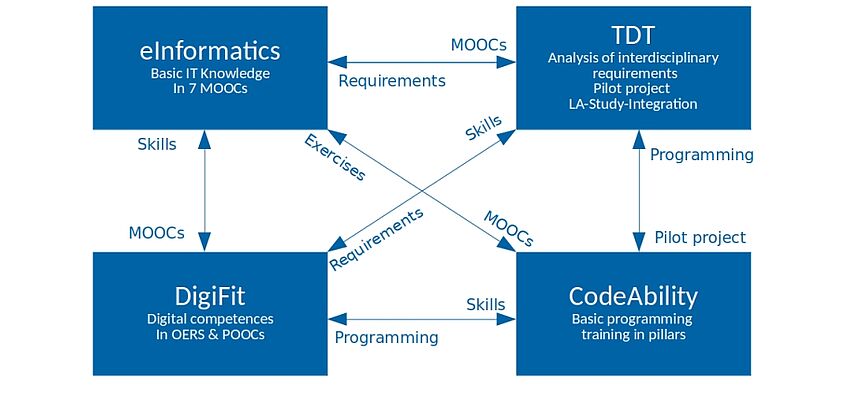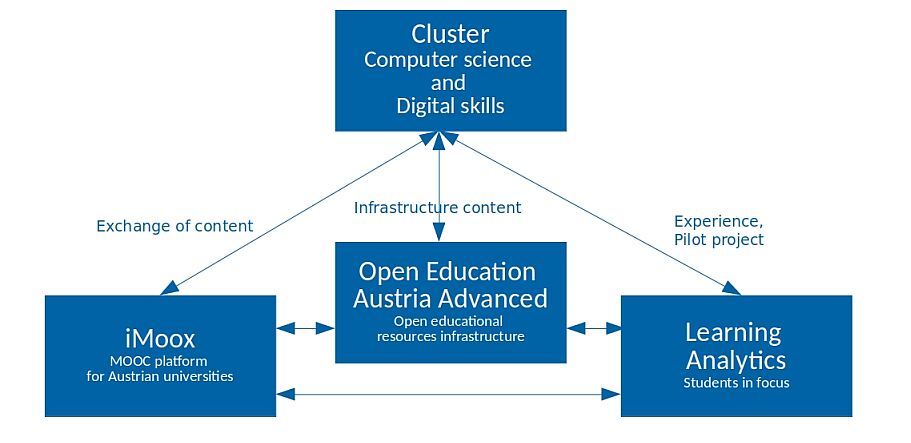Cooperation of the projects in the cluster
All projects work towards the common goal of shaping the digital transformation. Each project has its own focus, but there is close cooperation between all projects in numerous cross-cutting topics.
The eInformatics@Austria and CodeAbility projects are concerned with conveying basic computer science knowledge to broad target groups. The eInformatics@Austria project is developing qualitative MOOCs that prepare essential basic computer science knowledge didactically and scientifically in such a way that the content is accessible to a broad target group. The MOOCs will be freely available and are aimed at students and teachers at universities as well as the entire interested public. An indispensable part of basic informatics knowledge is programming skills.
The CodeAbility project is developing a platform for digitally supported programming education and didactic concepts that combine classroom and online elements to enable a deep understanding of programming. The practice opportunities in CodeAbility are an optimal complement to the MOOCS of eInformatics@Austria.
The DigiFit4All project is developing the technical basis for personalised Open Online Courses, which make it possible to provide computer science content in a customised form for time- and location-independent learning. Personalised learning paths are determined based on a competence model. This competence model has already been developed in advance and will be completed within the framework of the project. The competence model shows dependencies of basic computer science content that will be incorporated into eInformatics@Austria and CodeAblility.
The Teaching Digital Thinking project follows a user-centred design approach. We analyse which informatics knowledge and which digital competences other disciplines demand in order to create corresponding educational offers - taking into account the offers from the cluster projects - and to integrate them into curricula. The latter results in pilot projects, for example with the humanities and social sciences and the teaching profession. In these pilot projects, the results of the other projects are also evaluated. Another focus is on the expansion of computer science studies to include interdisciplinary competences for the purpose of broadening the horizon to include legal, human, social, ethical aspects.
The sketch below schematically illustrates the close cooperation within the cluster. The terms above the arrows summarise the most important results of the projects, which flow into the other projects. Content includes, for example, learning objectives, didactic designs for conveying content and documents such as worksheets. Competences refers to the whole process of specifying and teaching competences.

The MOOCs created by eInformatics are used in all other projects. At the same time, eInformatics receives feedback from the other projects that flows into the MOOC creation: feedback from Teaching Digital Thinking on the requirements of non-computer scientists and from DigiFit4All on dependencies according to the competence model developed there.The programming exercises created in CodeAbility are an ideal complement to the MOOCs. Teaching Digital Thinking provides all projects with the results of the requirements survey on basic IT knowledge; in later project phases, also pilot studies to evaluate the developed educational resources, methods and content. TDT receives from the other projects the MOOCs and OERs developed there and from DigiFit4All the dependencies on basic competences. DigitFi4All provides all projects with the competency model to be developed and receives from the other projects requirements for competencies as well as OERs to cover competencies. CodeAbiltiy provides all projects with OERs for basic programming education.
All projects ensure a broad usability of their results. To this end, they make the results available in a common learning repository and, if possible, link them to iMoox or Open Education Austria Advanced. If possible, the results will be incorporated into learning platforms or curricula. The results should be modular so that they can be transferred to other target groups and disciplines through specialisation or extension. The results of the projects are not only learning content, such as MOOCs or OERs, but also educational offers and specialised publications. All projects place great emphasis on evaluation, e.g. in the form of formative assessment. Regular meetings, a governing body and a steering committee organise and accompany the cooperation of the projects.
Cooperation with other digitisation projects

The iMoox platform offers free Massive Open Online Courses (MOOCs) to make university and other content available for self-study independent of time and place. The sub-projects of the cluster will make their results available on the iMoox platform whenever it is possible and makes sense. We will also make use of content that already exists there. Open Education Austria Advanced provides an infrastructure to support teachers in the creation of Open Educational Resources (OER). The project is also developing a cross-university search portal for OERs. We will use this infrastructure and integrate the OERs developed within our project cluster into the search portal. The Learning Analytics project develops methods to support learning processes in the university context. We would like to exchange experiences with this project, in particular this lends itself to the DigiFit4All and CodeAbility projects. At a later stage, the Teaching Digital Thinking project will offer interesting pilot studies in which the methods developed in Learning Analytics can be tried out.
